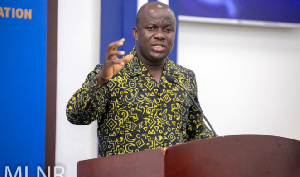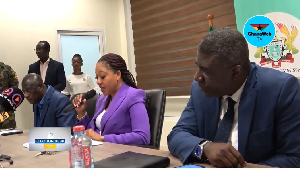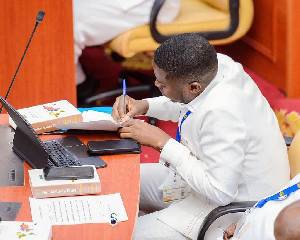Ghana is set to introduce a new legislative framework aimed at restricting the export of raw bauxite, according to Samuel Abu Jinapor, Minister of Lands and Natural Resources.
Speaking at the 2024 West African Mining and Power Conference and Exhibition (WAMPOC/WAMPEX) opening ceremony in Accra, Mr. Jinapor outlined the government’s strategy for harnessing the country’s vast bauxite reserves to develop an integrated aluminium industry.
“We are in the process of enacting a Legislative Instrument, pursuant to section 28 of the Ghana Integrated Aluminium Development Corporation Act, 2018 (Act 976), to restrict the export of bauxite in its raw state,” he announced.
He added: “This will enable us to leverage our over nine hundred million metric tonnes (mmt) of bauxite resources to build an integrated aluminium industry in-country.”
The government, he noted, continues to implement policies and programs designed to create an enabling environment to drive sustainable investment in responsible mining and power generation.
“We are investing in infrastructure to decentralise operations of the Minerals Commission, regulator of the sector, to make it more efficient in regulating and monitoring mining operations,” he added.
Additionally, he said the government is intent on taking the Minerals Commission’s regulatory mandate to where mining actually takes place, thereby promoting efficiency in service delivery and effective monitoring of mining operations.
To this end, he said efforts are being made to review and update regulatory frameworks to promote transparency, accountability, and good governance within the sector, working actively with industry players including the Ghana Chamber of Mines.
The Chamber of Mines, he added, “is our natural partner in the exploitation and management of our mineral resources, to encourage investments in sustainable technologies, practices, and initiatives that enhance operational efficiency and mitigate environmental impacts.”
Moreover, he asserted that the government is promoting investment in exploration to uncover new mineral reserves and sustain the long-term viability of our mining industry.
“We are, for example, working with the Ghana Revenue Authority (GRA) and Ghana Chamber of Mines, under the guidance of the government’s Economic Management Team, to explore the best framework for treating critical imposts such as Value-Added Tax (VAT) on exploration,” he stated.
If properly structured, the minister said, it will reduce the financial burden on exploration companies, making it more attractive to invest in exploration while safeguarding the nation’s interest.
“These initiatives underscore our commitment to creating a conducive environment for exploration, investment, and promoting the discovery of new mineral deposits. By incentivising exploration, we aim to unlock the full potential of Ghana’s mineral wealth, create employment opportunities, and stimulate economic growth in the mining sector and beyond.
“To ensure that Ghanaians benefit fully from these resources, we are putting in place measures to promote beneficiation and value addition as well as local content and local participation in the sector,” he stated.
The 17th edition of the West African Mining and Power Conference and Exhibition, organised in partnership with the Ghana Chamber of Mines, is being held under the theme ‘The Mining and Power Hub: Driving Sustainable Investment Opportunities in West Africa.’
WAMPOC/WAMPEX is an international networking Conference and Exhibition for the mining and power industry in West Africa that brings together captains of mining and power companies, West African ministers for mining and power, international and local investors, NGOs, researchers, and traditional leaders.
The three-day event is expected to provide a platform for mining stakeholders to have an opportunity to identify, showcase, and benefit from sustainable models to improve business efficiency for steady growth despite prevailing bottlenecks in the industry.
Business News of Friday, 7 June 2024
Source: thebftonline.com

















